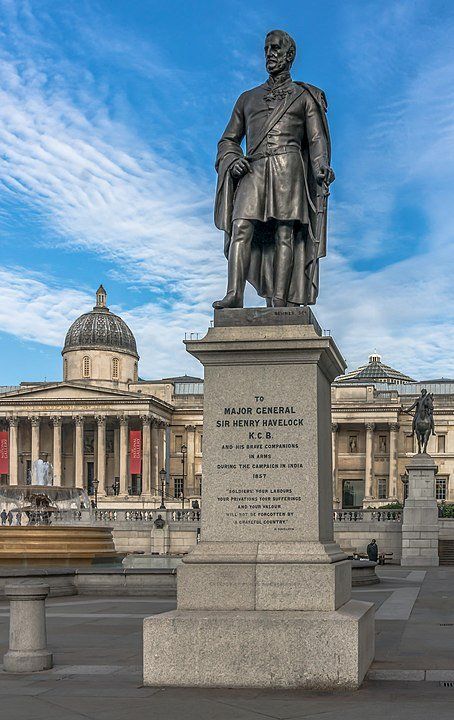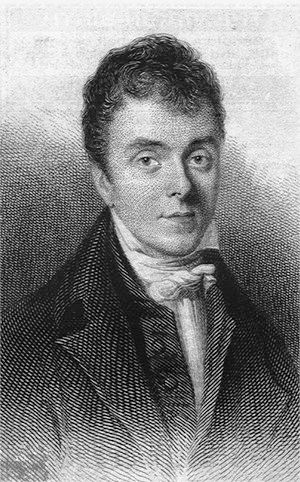
Next to Nelson’s column in Trafalgar Square stands the statue of Major General Sir Henry Havelock, the nation’s tribute to a gallant Christian soldier. Yet few readers are likely to have heard of him.
When news of his death reached England at the height of the Indian Mutiny, The Times said it fell ‘upon the British public with the suddenness of a thunderclap’. The Daily Telegraph wrote: ‘General Sir Henry Havelock is dead and a whole nation mourns his loss. The people had adopted him … recognised a hero … [and] ranked him among the noblest in England’s history’.
Biblical godliness
‘Never since the death of Nelson’, ran another account, ‘has the removal of any commander been so deeply and universally deplored’. Queen Victoria remarked that she felt she had lost a brother. Flags flew at half-mast on shipping and government buildings in New York and Boston harbour — a tribute not paid even to the Duke of Wellington.
A funeral sermon was preached in Westminster Abbey. Over a thousand had to be turned away from a memorial service at Bloomsbury Baptist Church, where Havelock attended when on leave. (A repeat service took place a week later.)
Nearly every English town and city has a street or road named after him, and the headquarters of the Soldiers’ and Airmen’s Scripture Readers Association is called Havelock House. He was revered as a man who mixed the highest military genius with biblical godliness.
Havelock was the son of a shipbuilder and, like John Wesley, was educated at Charterhouse School. His father’s business failed and Henry became an unwilling officer in the Rifle Brigade. To secure promotion, he transferred to the ‘13th of Foot’ and sailed for India. It was on this voyage in 1823 that the pivotal event of his life occurred.

Conversion
James Gardner, a young officer of only twenty-one, lent Havelock two Christian biographies — those of Henry Martyn and Thomas Scott. As Havelock read these and argued with Gardner, the Spirit of God came to him with his ‘offer of peace and a mandate of love’.
Convinced that Gardner was telling him the truth, he counted the cost of discipleship, realising that ridicule and discrimination might well await him. He repented and put his trust in Christ alone for salvation.
God has a wonderful way of giving his children the Christian friends they need. In John Marshman, the owner and editor of Friend of India, Havelock found a Christian who could provide him with the intellectual and spiritual fellowship he so greatly needed.
To the disgust of his brother officers, Havelock started Christian meetings for his soldiers — although his Commanding Officer and his wife stood with him. Gardner also supported him, but was shortly to be invalided back to England and retirement. As Gardner left, Havelock said: ‘Give me your hand, for I owe you more than any man living’.
Path of duty
Havelock married John Marshman’s sister, Hannah, who was converted during their courtship. She proved an ideal helpmeet, bearing the same scorn as her husband as he matched his professional excellence with devoted Christian service.
At a time when the army recruited men from the jails, and took little trouble to provide for their welfare, Havelock was working with a definite purpose. ‘It was the great object of my ambition’, he wrote, ‘to be surpassed by none in zeal and determination in the path of my duty, because I was resolved to put down the vile calumny that a Christian could not be a meritorious soldier’.
John Pollock describes Havelock’s meetings for his soldiers in his masterly biography Way to Glory (republished by Christian Focus). Sixty or more men would risk the ribaldry of their fellows to take seats at the back of the chapel to hear the gospel on a Sunday evening.

‘The palm-mats were rolled up and the room open to the hot still air. Round the walls vegetable oil lamps guttered and flickered. The singing and prayers done, the men sat stiff and erect. Havelock spoke. He knew what they needed, and told them in clipped, simple phrases.
‘”Time is short and eternity is at hand”, he would begin, and the men remembered the dozen or more of their comrades buried in the past six or nine months, “so I must not delay to speak to you on the most important of all subjects — the care and prospects of your immortal souls.
‘”Do not suffer yourself to be deceived by the false names which men give to things; but look steadily at the abiding truth, that mankind is divided into two classes — the children of God, and the servants of the world and its prince — Satan. Make at once your choice for that good part which shall not hereafter be taken from you.
‘”Come to the Lord Jesus Christ, and ask him for instruction and enlightenment of mind, and change of heart; and then do all that he commands you, and you shall be happy for ever … Learn to regard Jesus Christ as personally your friend and benefactor, to come to him for all that you need, to feel assured all your sins are laid on him”.’
Courage
Havelock was greatly encouraged by Baptist missionaries, so it is not surprising that both he, and many of the soldiers who came under his influence, became Baptists. In 1832 he petitioned the authorities for liberty of worship, already accorded to Roman Catholics, to be extended to Free Churchmen.
For seven years this petition filtered through the appropriate channels until, in July 1839, Havelock’s request led to liberty of worship for the whole British Army.
In spite of all the prejudice against him, Havelock steadily progressed, as his courage and military acumen became evident. It was his habit to preserve a time for Bible reading and prayer at the start of the day, on operations as well as at home.
At Jalalabad, during the Afghan War in 1841, with possible disaster impending, Havelock was asked by his former Commanding Officer to take the morning service. Captain Thomas Seaton wrote of his experience that day:
‘Everyone came as usual, with sword and pistol or musket and bayonet, and sixty rounds in pouch ready at a moment’s notice to march to battle. To me it was an affecting sight to see those great rough fellows of the 13th, with their heads bowed, humbly confessing their sins before God, and acknowledging their dependence on his goodness and mercy’.
Hope in God
In his clear, rather abrupt voice, Havelock read Psalm 46: ‘God is our hope and strength, a very present help in trouble. Therefore will we not fear … The Lord of hosts is with us: the God of Jacob is our refuge. Be still then and know that I am God: I will be exalted among the heathen, and I will be exalted in the earth.’
Eleven weeks later the Afghan army was routed and Havelock recorded: ‘I felt that the Lord Jesus was at my side’. To the end of his life he observed the anniversary of this ‘crowning mercy’.
Another who made Havelock’s acquaintance at this time was Henry Lawrence, later Resident in Lucknow. They shared a common faith in Christ. Lawrence wrote:
‘I went to Havelock’s chapel yesterday evening. He had about forty soldiers and ten or twelve officers. He prayed extemporarily, read a few verses, sang two hymns, and read a sermon on faith, hope and charity … I went home with him to his tent, and sat for a couple of hours … He reads and prays much as if on parade, but he is a good man and a good soldier. I have never heard either doubted’.
Recovery
Fifteen years later, now aged 51 and with 22 battles behind him, Havelock was appointed Deputy Adjutant General in Bombay. Previously, his name had been deliberately suppressed in promotion lists, until Lord Hardinge, the Governor General, intervened with the Duke of Wellington.
It may have been then that Hardinge, waving goodbye to the little grey-haired colonel, uttered his famous phrase: ‘Every inch a soldier, and every inch a Christian’. Later Hardinge was to say to Hannah:
‘If there is an officer of the Army who on his own account could dispense with the glory of seeking further opportunities of making you a widow, your husband is the man — for he has done more, seen more and been shot at more than any man of his rank’.
Not least of Havelock’s worries at this time was the extravagant conduct of his rebellious and unregenerate son. This may well have contributed to his breakdown in health, which necessitated his return to England in 1849 after twenty-six years of continuous service in India.
He was apparently a broken and feeble old man. But two years later, his health wonderfully recovered, and encouraged by his second son’s conversion, Havelock was able to return to India.
For family and financial reasons, Hannah was unable to accompany him. Professionally, he could see nothing ahead but a few more years of dull, routine service before retirement. He would have been amazed to know that in less than six years he would be world-famous. God was about to match the moment with his man, for ‘God was with him’.







